Using Anthropic API with Gram-hosted MCP servers
Anthropic’s Messages API supports remote MCP servers through their MCP connector feature. This allows you to give Claude models direct access to your tools and infrastructure by connecting to Gram-hosted MCP servers.
This guide will show you how to connect Anthropic’s API to a Gram-hosted MCP server using an example Push Advisor API. You’ll learn how to create an MCP server from an OpenAPI document, set up the connection, configure authentication, and use natural language to query the example API.
Find the full code and OpenAPI document in the Push Advisor API repository.
Prerequisites
Section titled “Prerequisites”You’ll need:
- A Gram account.
- An Anthropic API key.
- A Python environment set up on your machine.
- Basic familiarity with making API requests.
Creating a Gram MCP server
Section titled “Creating a Gram MCP server”If you already have a Gram MCP server configured, you can skip to connecting Anthropic API to your Gram-hosted MCP server. For an in-depth guide to how Gram works and more details on creating a Gram-hosted MCP server, check out our introduction to Gram.
Setting up a Gram project
Section titled “Setting up a Gram project”In the Gram dashboard, click New Project to start the guided setup flow for creating a toolset and MCP server.
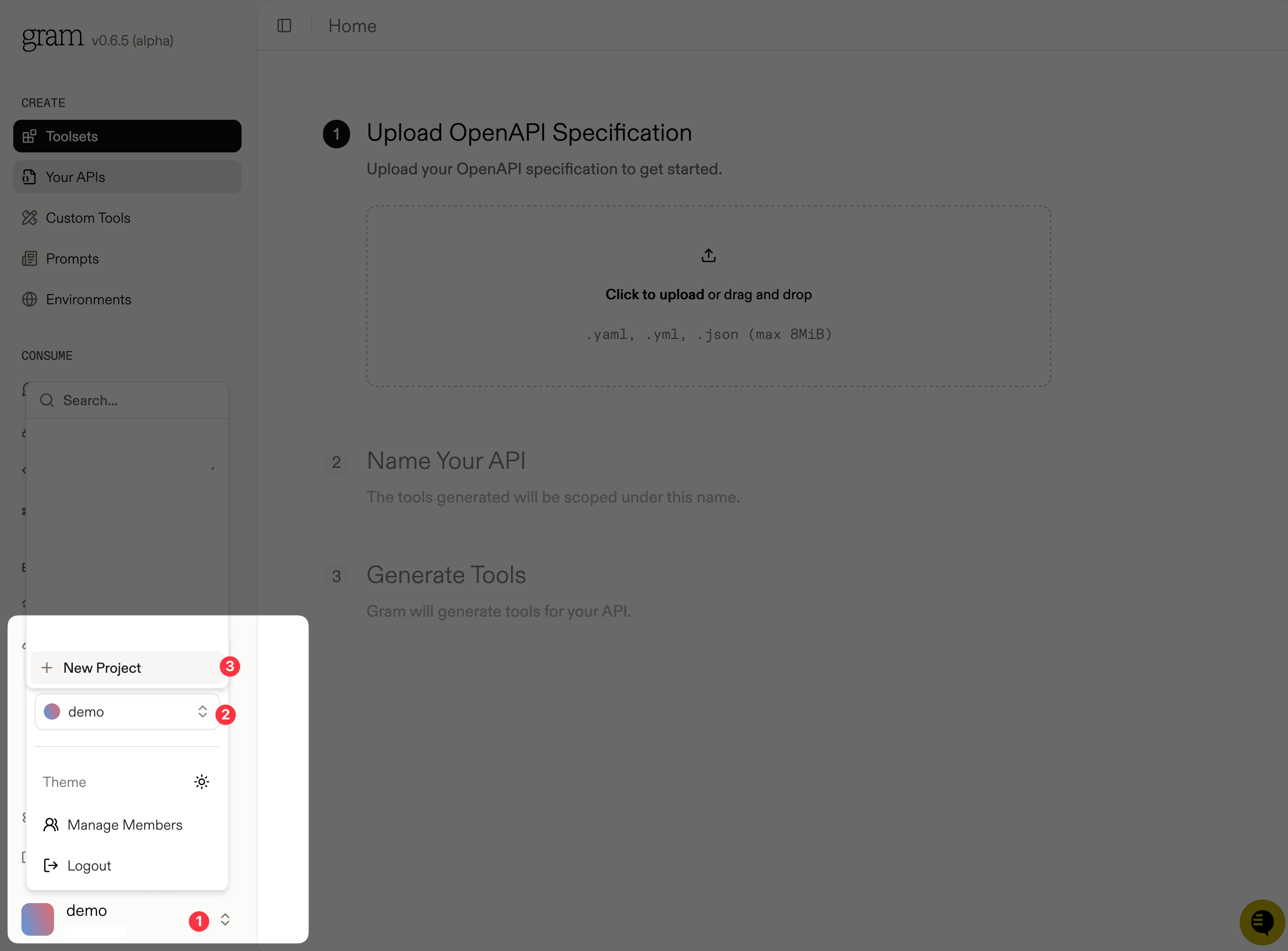
Enter a project name and click Submit.
Gram will then guide you through the following steps.
Step 1: Upload the OpenAPI document
Section titled “Step 1: Upload the OpenAPI document”Upload the Push Advisor OpenAPI document, enter the name of your API, and click Continue.
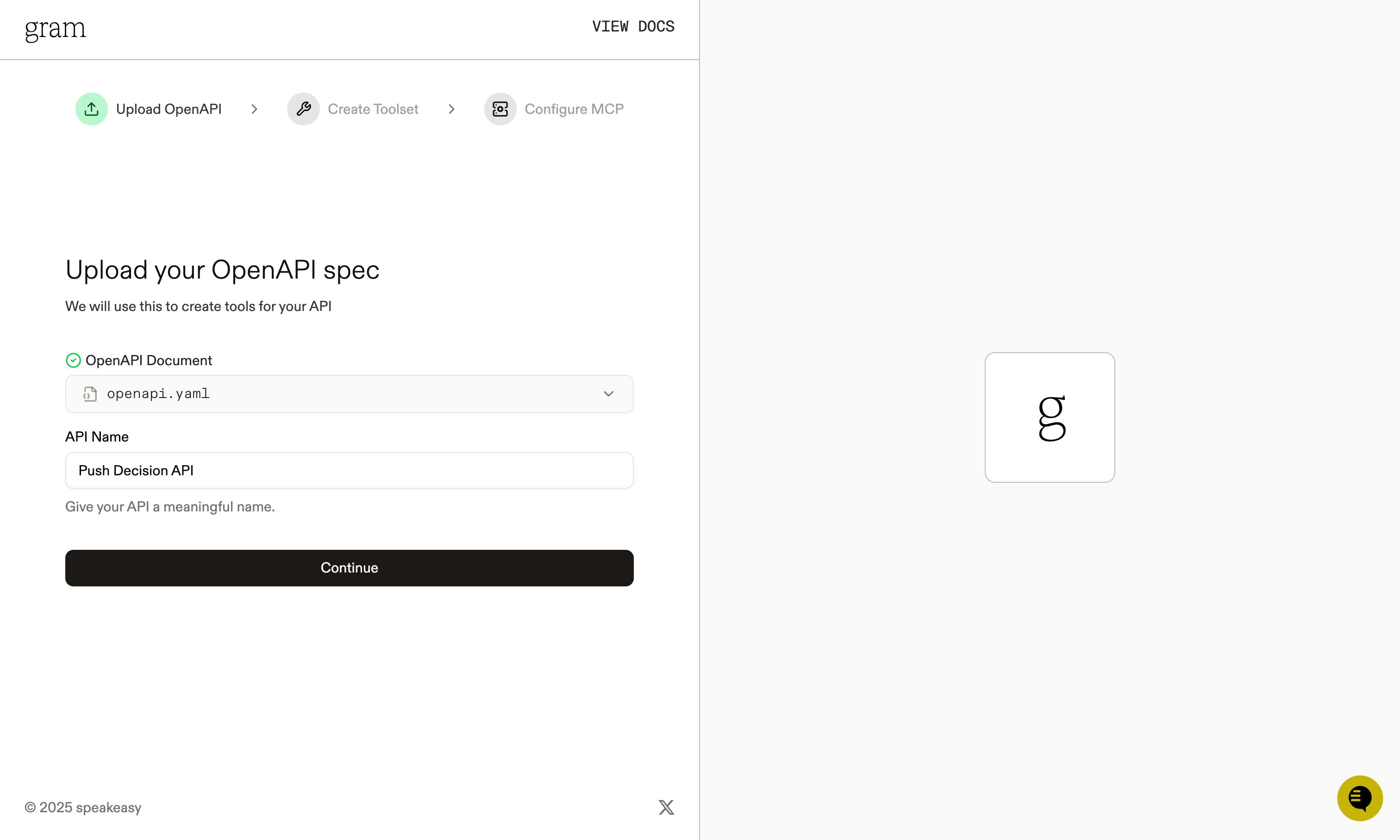
Step 2: Create a toolset
Section titled “Step 2: Create a toolset”Give your toolset a name (for example, “Push Advisor”) and click Continue.
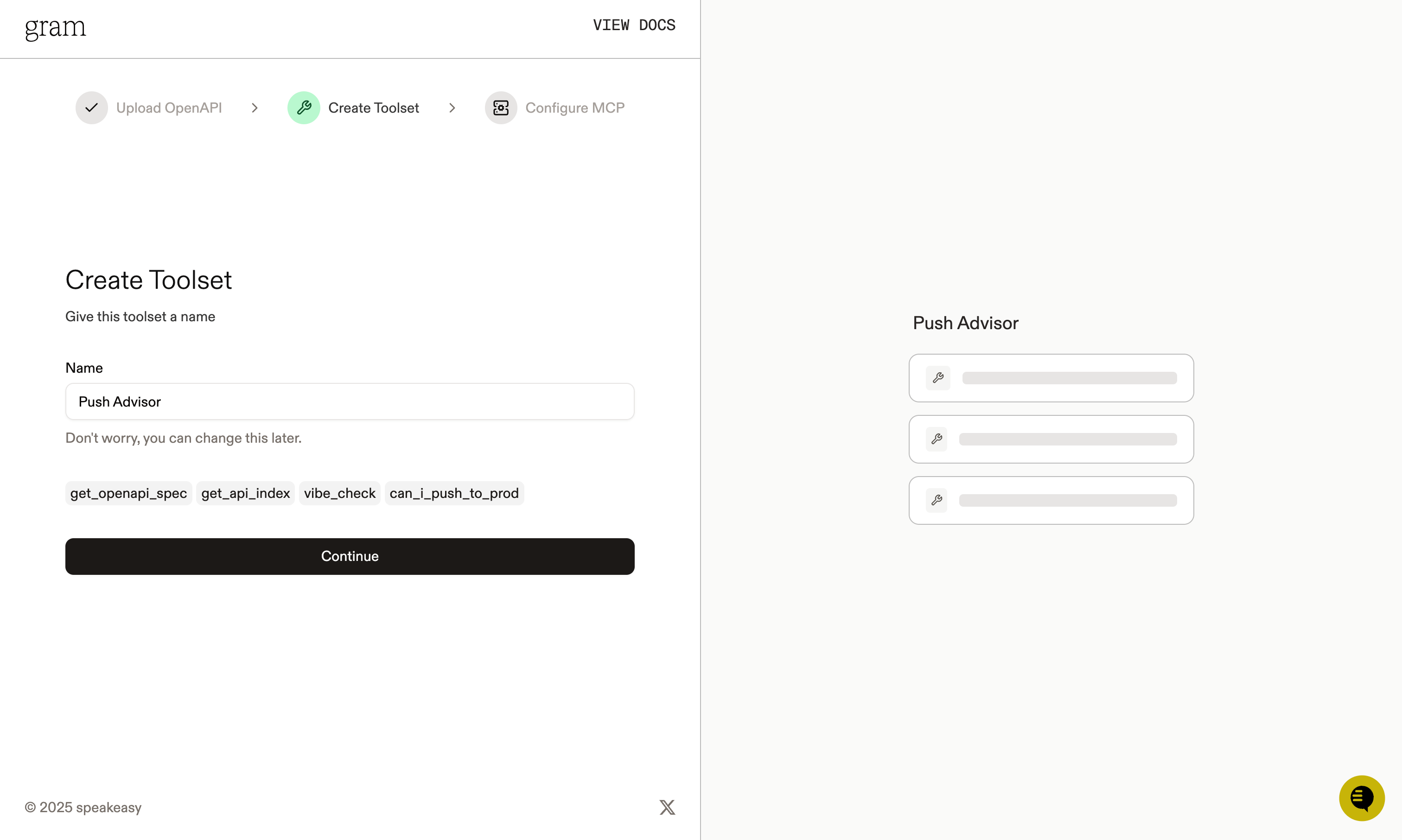
Notice that the names of the tools that will be generated from your OpenAPI document are displayed in this dialog.
Step 3: Configure MCP
Section titled “Step 3: Configure MCP”Enter a URL slug for the MCP server and click Continue.
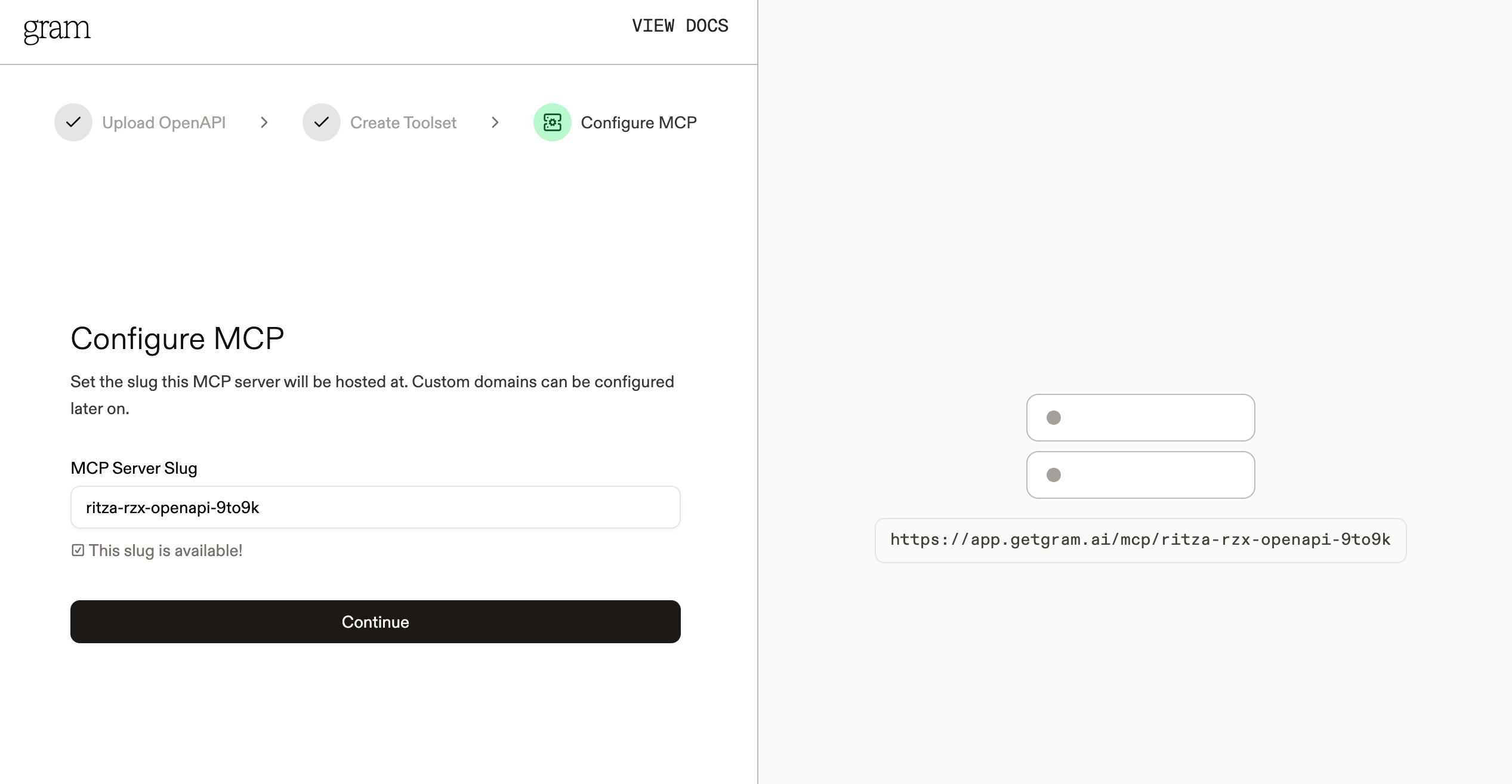
Gram will create a new toolset from the OpenAPI document.
Click Toolsets in the sidebar to view the Push Advisor toolset.
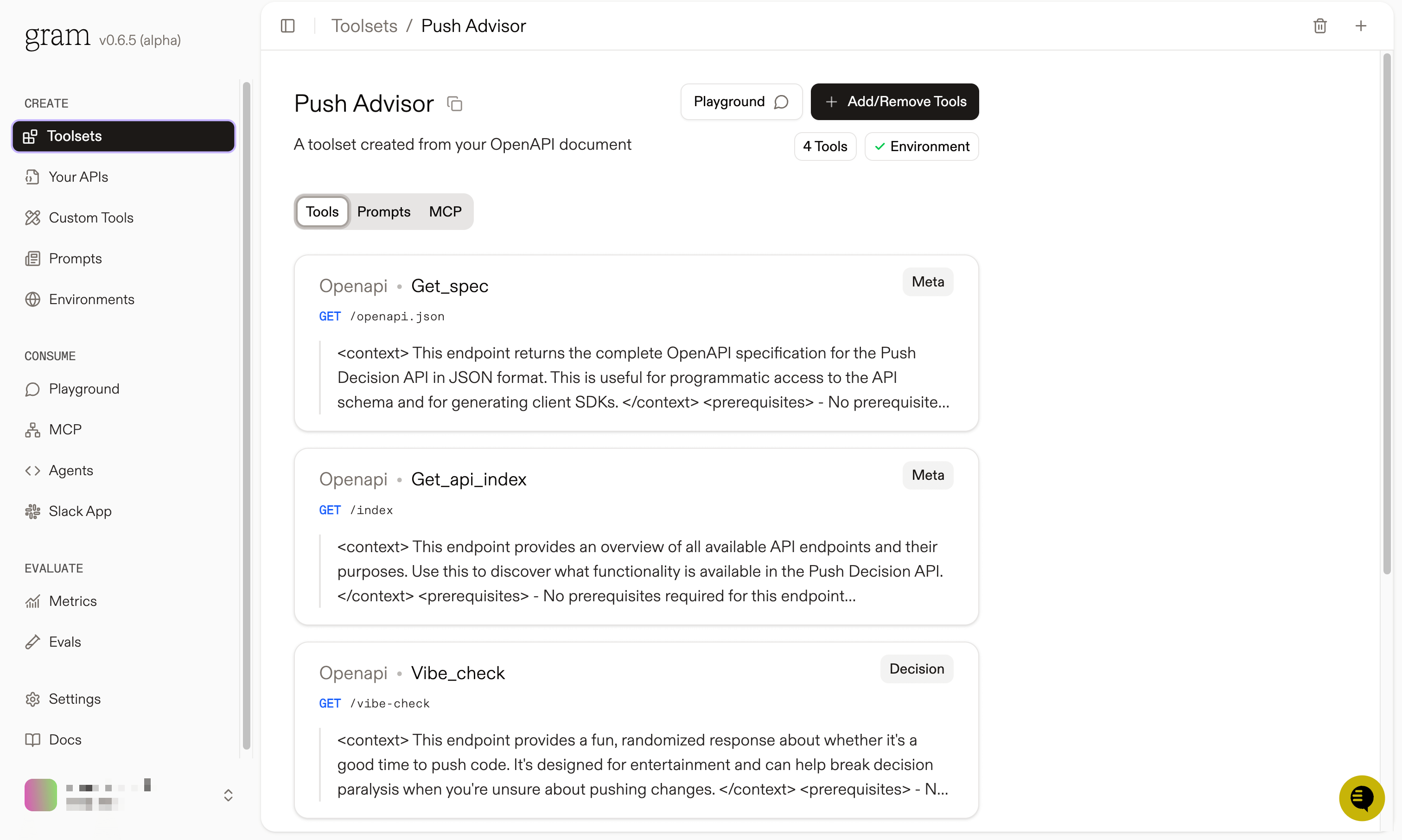
Publishing an MCP server
Section titled “Publishing an MCP server”Let’s make the toolset available as an MCP server.
Go to the MCP tab, find the Push Advisor toolset, and click the title of the server.
On the MCP Details page, tick the Public checkbox and click Save.
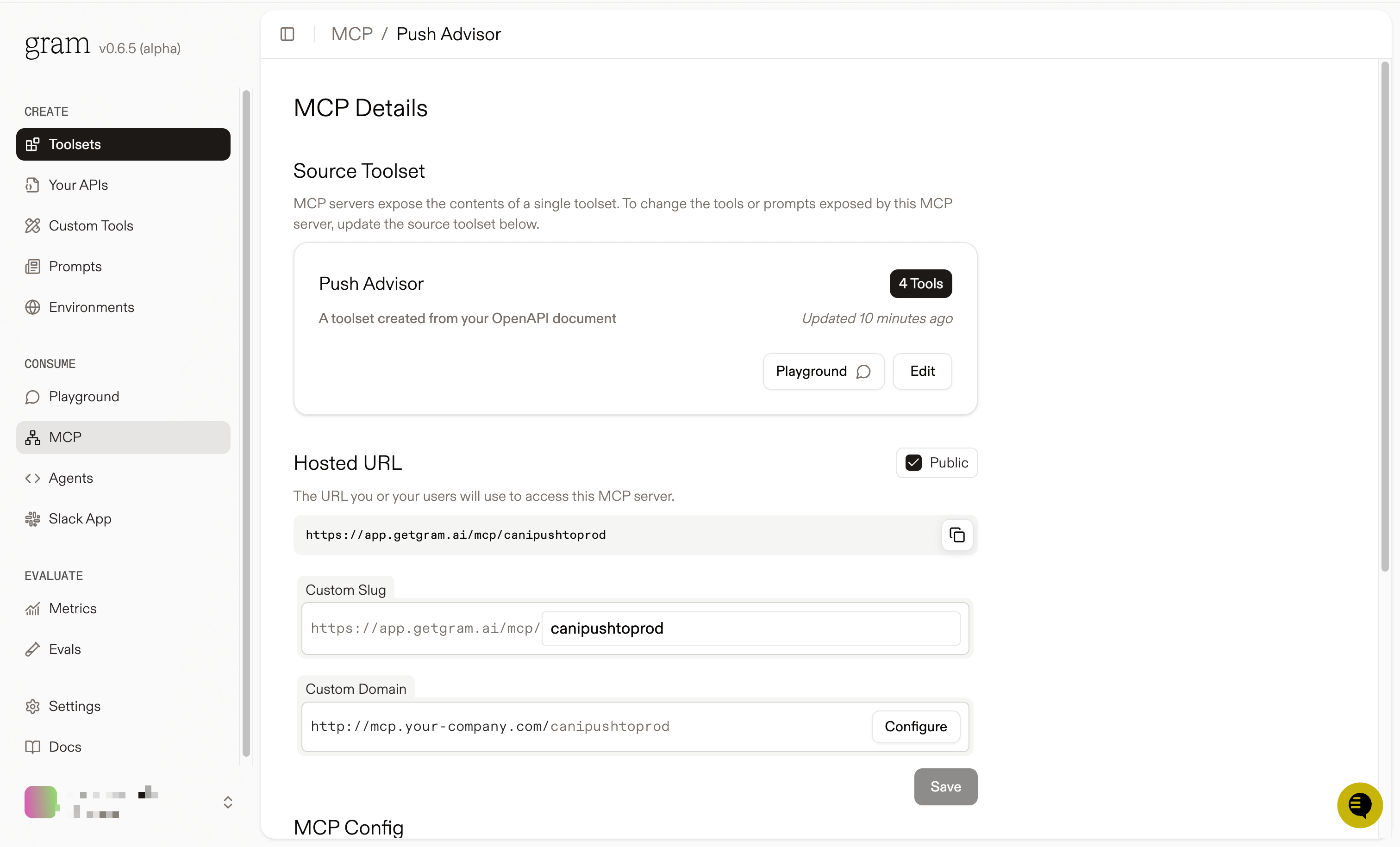
Scroll down to the MCP Config section and note your MCP server URL. For this guide, we’ll use the public server URL format:
https://app.getgram.ai/mcp/canipushtoprod
For authenticated servers, you’ll need an API key. Generate an API key in the Settings tab.
Connecting Anthropic API to your Gram-hosted MCP server
Section titled “Connecting Anthropic API to your Gram-hosted MCP server”The Anthropic Messages API supports MCP servers through the mcp_servers parameter. Here’s how to connect to your Gram-hosted MCP server.
Basic connection (public server)
Section titled “Basic connection (public server)”Here’s a basic example using a public Gram MCP server. Start by setting your Anthropic API key:
export ANTHROPIC_API_KEY=your-anthropic-api-key-hereInstall the Anthropic Python package:
pip install anthropicThen run the following Python script:
from anthropic import Anthropic
client = Anthropic()
response = client.beta.messages.create( model="claude-sonnet-4-20250514", max_tokens=1000, messages=[ { "role": "user", "content": "What's the vibe today?" } ], mcp_servers=[ { "type": "url", "url": "https://app.getgram.ai/mcp/canipushtoprod", "name": "gram-pushadvisor" } ], betas=["mcp-client-2025-04-04"])
print(response.content[0].text)Authenticated connection
Section titled “Authenticated connection”For authenticated Gram MCP servers, include your Gram API key using the authorization_token parameter.
It is safest to use environment variables to manage your API keys, so let’s set that up first:
export ANTHROPIC_API_KEY=your-anthropic-api-key-hereexport GRAM_API_KEY=your-gram-api-key-hereAgain, with the Anthropic Python client installed, run the following Python script to connect to your authenticated Gram MCP server:
import osfrom anthropic import Anthropic
GRAM_API_KEY = os.getenv("GRAM_API_KEY")
if not GRAM_API_KEY: raise ValueError("Missing GRAM_API_KEY environment variable")
client = Anthropic()
response = client.beta.messages.create( model="claude-sonnet-4-20250514", max_tokens=1000, messages=[ { "role": "user", "content": "Can I push to production today?" } ], mcp_servers=[ { "type": "url", "url": "https://app.getgram.ai/mcp/canipushtoprod", "name": "gram-pushadvisor", "authorization_token": GRAM_API_KEY } ], betas=["mcp-client-2025-04-04"])
print(response.content[0].text)Understanding the configuration
Section titled “Understanding the configuration”Here’s what each parameter in the mcp_servers array does:
type: "url"- Specifies this is a URL-based MCP server.name- A unique identifier for your MCP server.url- Your Gram-hosted MCP server URL.authorization_token- Authentication token (optional for public servers).tool_configuration- Tool filtering and permissions (optional).
Tool filtering and permissions
Section titled “Tool filtering and permissions”Using the tool_configuration parameter, you can control which tools are available for use in your MCP server while making an API call.
Filtering specific tools
Section titled “Filtering specific tools”If your Gram MCP server has multiple tools but you only want to expose certain ones in this particular API call, use the allowed_tools parameter:
import osfrom anthropic import Anthropic
client = Anthropic()
response = client.beta.messages.create( model="claude-sonnet-4-20250514", max_tokens=1000, messages=[ { "role": "user", "content": "What is the vibe today?" } ], mcp_servers=[ { "type": "url", "url": "https://app.getgram.ai/mcp/canipushtoprod", "name": "gram-pushadvisor", "tool_configuration": { "enabled": True, "allowed_tools": [ "can_i_push_to_prod", # "vibe_check", # Excluded from the allowed tools ] } } ], betas=["mcp-client-2025-04-04"])
for content in response.content: if content.type == "text": print(content.text)# Generic claude response, extra chipper and definitely not from our test server.Note how the vibe_check tool is excluded from the allowed_tools list. This means it won’t be available for use in this API call, even if it’s defined in your curated toolset and MCP server.
Disabling tools
Section titled “Disabling tools”You can also disable all tools from a server while keeping the server connection active:
mcp_servers=[ { "type": "url", "url": "https://app.getgram.ai/mcp/canipushtoprod", "name": "gram-pushadvisor", "tool_configuration": { "enabled": False } }]Working with responses
Section titled “Working with responses”The Anthropic Messages API returns specific content block types when using MCP tools:
MCP tool use blocks
Section titled “MCP tool use blocks”When Claude uses an MCP tool, you’ll see an mcp_tool_use block in the response:
{ "type": "mcp_tool_use", "id": "mcptoolu_014Q35RayjACSWkSj4X2yov1", "name": "can_i_push_to_prod", "server_name": "gram-pushadvisor", "input": {}}MCP tool result blocks
Section titled “MCP tool result blocks”The results of tool calls appear as mcp_tool_result blocks:
{ "type": "mcp_tool_result", "tool_use_id": "mcptoolu_014Q35RayjACSWkSj4X2yov1", "is_error": false, "content": [ { "type": "text", "text": "{'safe_to_push': true, 'reason': 'It's a Tuesday and the vibe is excellent!'}" } ]}Error handling
Section titled “Error handling”Failed tool calls will have is_error: true in the result block:
from anthropic import Anthropic
client = Anthropic()
try: response = client.beta.messages.create( model="claude-sonnet-4-20250514", max_tokens=1000, messages=[ { "role": "user", "content": "What's the deployment status?" } ], mcp_servers=[ { "type": "url", "url": "https://app.getgram.ai/mcp/canipushtoprod", "name": "gram-pushadvisor" } ], betas=["mcp-client-2025-04-04"] )
# Check for MCP tool errors in the response for content in response.content: if hasattr(content, 'type') and content.type == 'mcp_tool_result': if hasattr(content, 'is_error') and content.is_error: print(f"Tool error occurred: {content}")
print(response.content[0].text)except Exception as error: print(f"API call failed: {error}")Differences from OpenAI’s MCP integration
Section titled “Differences from OpenAI’s MCP integration”While both Anthropic and OpenAI support MCP servers, there are key differences in their approaches:
Connection method
Section titled “Connection method”- Anthropic: Uses
mcp_serversparameter in Messages API with direct HTTP connections - OpenAI: Uses
toolsarray withtype: "mcp"in Responses API
Authentication
Section titled “Authentication”- Anthropic: Uses
authorization_tokenparameter for OAuth Bearer tokens - OpenAI: Uses
headersobject for authentication headers
Tool management
Section titled “Tool management”- Anthropic: Tool filtering via
tool_configurationobject withallowed_toolsarray - OpenAI: Tool filtering via
allowed_toolsparameter directly
API requirements
Section titled “API requirements”- Anthropic: Requires beta header
"anthropic-beta": "mcp-client-2025-04-04" - OpenAI: No special headers required for MCP support
Response format
Section titled “Response format”- Anthropic: Returns
mcp_tool_useandmcp_tool_resultblocks - OpenAI: Returns
mcp_callandmcp_list_toolsitems
Testing your integration
Section titled “Testing your integration”If you encounter issues during integration, follow these steps to troubleshoot:
Validate MCP server connectivity
Section titled “Validate MCP server connectivity”Before integrating into your application, test your Gram MCP server in the Gram Playground to ensure tools work correctly.
Use the MCP Inspector
Section titled “Use the MCP Inspector”Anthropic provides an MCP Inspector command line tool that helps you test and debug MCP servers before integrating them with Anthropic’s API. You can use it to validate your Gram MCP server’s connectivity and functionality.
To test your Gram MCP server with the Inspector:
# For public serversnpx -y @modelcontextprotocol/inspectorIn the Transport Type field, select Streamable HTTP.
Enter your server URL in the URL field, for example:
https://app.getgram.ai/mcp/canipushtoprodClick Connect to establish a connection to your MCP server.
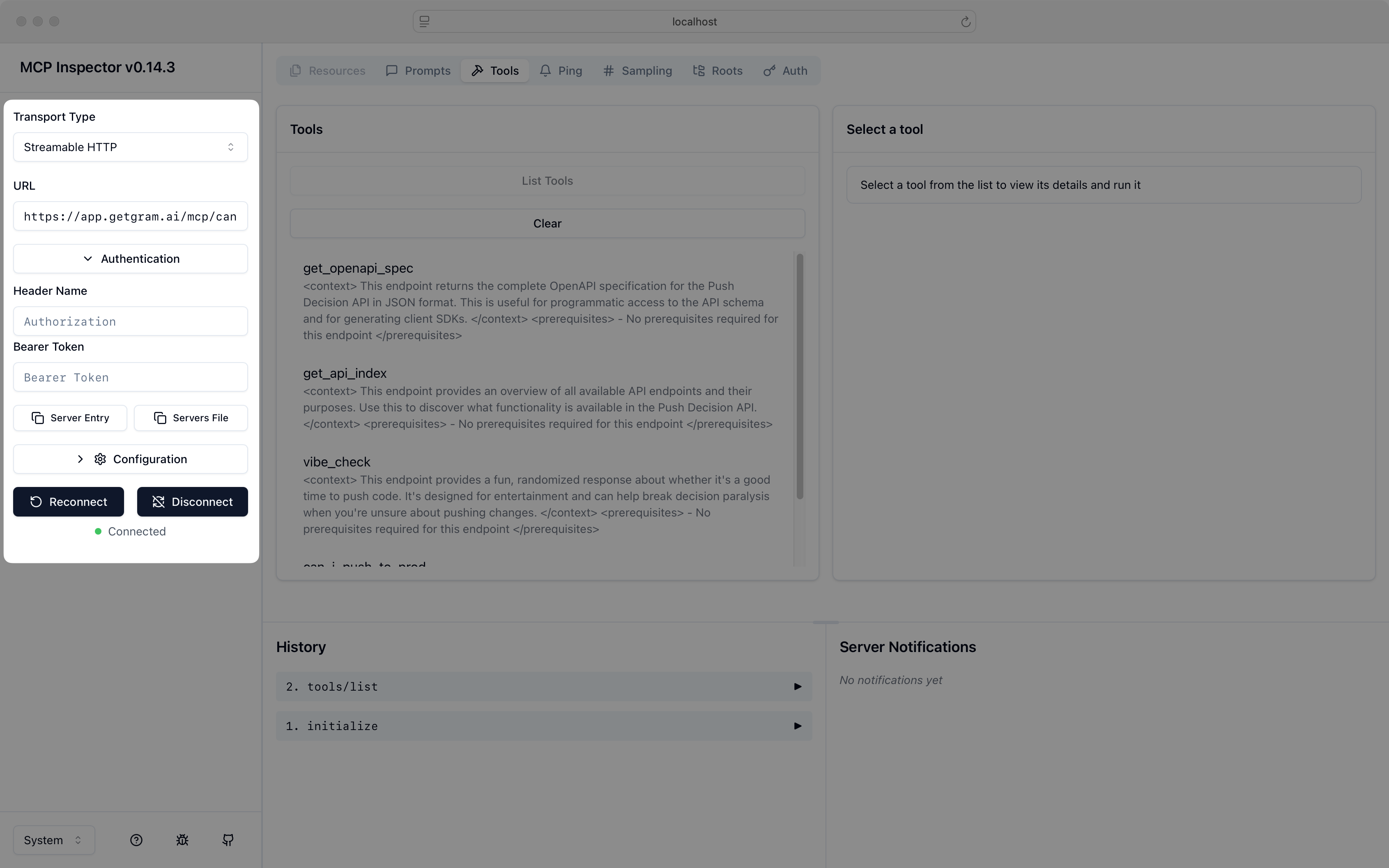
Use the Inspector to verify that your MCP server responds correctly before integrating it with your Anthropic API calls.
What’s next
Section titled “What’s next”You now have Anthropic’s Claude models connected to your Gram-hosted MCP server, giving them access to your custom APIs and tools.
Ready to build your own MCP server? Try Gram today and see how easy it is to turn any API into agent-ready tools that work with both Anthropic and OpenAI models.